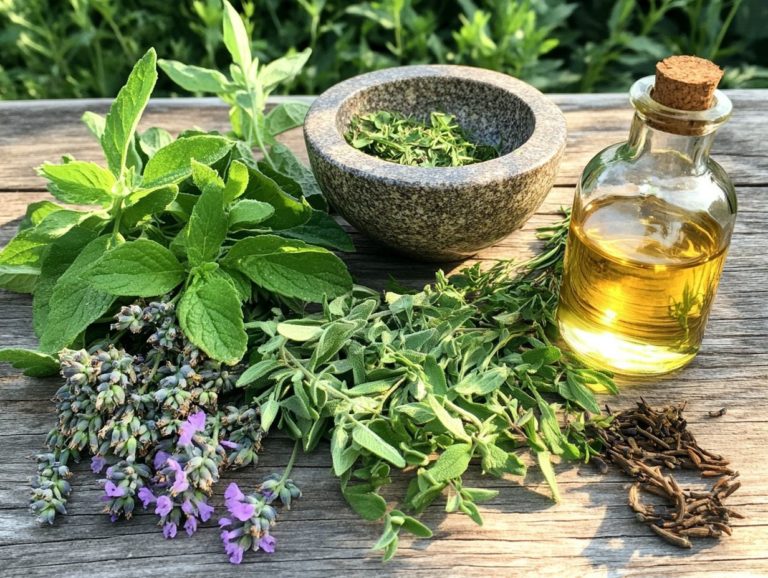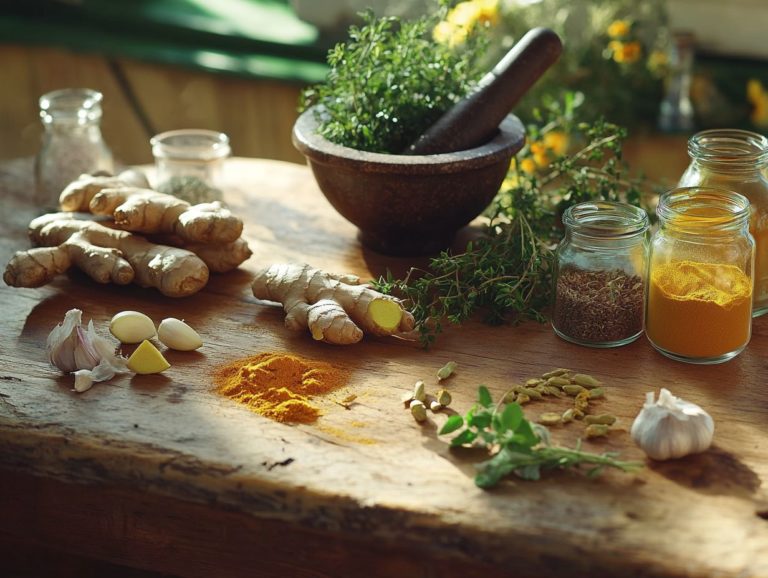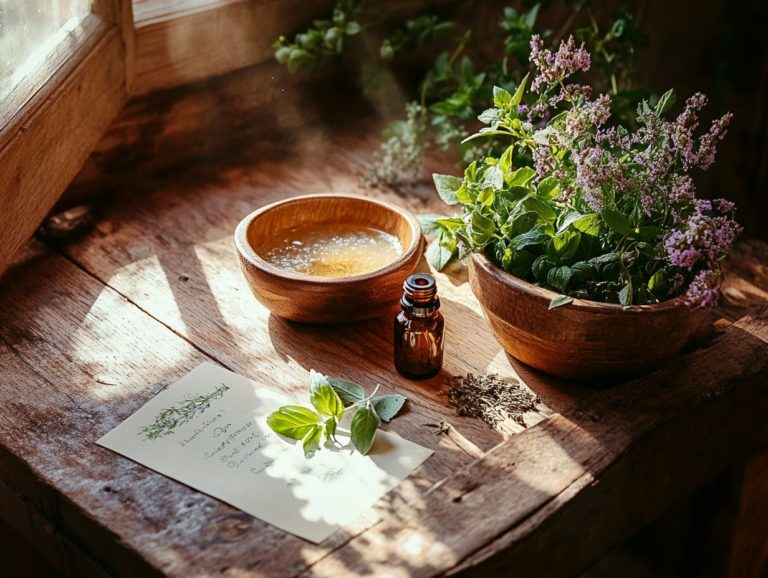DIY Herbal Remedies for Digestive Health
Are you weary of grappling with digestive issues, only to find that over-the-counter solutions come laden with unwanted side effects?
Herbal remedies could be the natural solution you ve been searching for. This article explores the common digestive problems you face and reveals natural solutions you can try today!
You ll discover straightforward DIY recipes to craft your own remedies at home, along with vital precautions to consider. Plus, you ll receive tips on effortlessly integrating these herbal solutions into your daily routine, paving the way for a healthier gut.
Contents
- Key Takeaways:
- Benefits of Using Herbal Remedies
- Common Digestive Issues and Corresponding Herbs
- DIY Herbal Remedies for Digestive Health
- Precautions and Side Effects
- Incorporating Herbal Remedies into Your Routine
- Frequently Asked Questions
- What are DIY herbal remedies for digestive health?
- Why should I consider DIY herbal remedies for digestive health?
- What are some common herbs used in DIY herbal remedies for digestive health?
- How do I make a DIY herbal tea for digestive health?
- Are there any precautions I should take when using DIY herbal remedies for digestive health?
- Can DIY herbal remedies for digestive health replace medical treatment for digestive issues?
Key Takeaways:

- Explore the benefits of using herbal remedies for digestive health, such as alleviating common issues like bloating and heartburn.
- Discover common herbs that can address specific stomach issues and learn how to make DIY remedies at home.
- Take precautions and be aware of potential risks when using herbal remedies, and find ways to incorporate them into your daily routine for maximum effectiveness.
Benefits of Using Herbal Remedies
People have used herbal remedies for centuries to improve digestive health and mitigate various stomach issues, including heartburn, dyspepsia, and bloating.
As their benefits gain recognition, many individuals like you are increasingly exploring natural options such as peppermint (Mentha x piperita), ginger (Zingiber officinale), and chamomile (Matricaria recutita) as alternatives to over-the-counter medications like Pepcid, Alka-Seltzer, and TUMS. If you’re looking for more effective solutions, consider herbal remedies for relieving constipation.
These remedies do more than just tackle symptoms like nausea and vomiting; they also contribute to overall gut health and support the community of bacteria in your gut. For additional support, consider exploring DIY herbal treatments for skin irritations.
Common Digestive Issues and Corresponding Herbs
Common digestive issues like nausea, heartburn, and bloating can be effectively managed with targeted herbal remedies designed for each specific condition. For example, you may find ginger (Zingiber officinale) particularly effective against nausea from motion sickness or morning sickness.
Similarly, digestive bitters can serve as a helpful ally in aiding digestion and alleviating heartburn. Understanding how to pair these herbs with stomach issues is essential for achieving optimal digestive health. Incorporating top DIY herbal remedies for stress relief can also support your overall well-being.
Identifying and Addressing Digestive Problems
Identifying and addressing digestive issues requires a discerning eye for the symptoms associated with various stomach issues, such as bloating, belching, and diarrhea. By recognizing these signs, you can seek appropriate herbal remedies to support your digestive health and enhance your overall well-being.
Understanding these common symptoms is crucial, as they often indicate a deeper issue, such as food intolerances, imbalances in gut bacteria, or even stress-related disorders. By observing how your body responds after meals, you can detect patterns that deserve further investigation.
Incorporate herbal remedies like peppermint, ginger, and fennel to offer soothing relief and promote gut health, helping with digestion while minimizing discomfort. For effective options, consider DIY herbal remedies for common cold relief. Ultimately, embracing a holistic approach not only addresses immediate symptoms but also nurtures long-term wellness, allowing your body to truly thrive.
DIY Herbal Remedies for Digestive Health

Crafting DIY herbal remedies for digestive health is an empowering endeavor that invites you to harness the power of kitchen-garden ingredients and herbal medicine to elevate your well-being.
By incorporating elements like turmeric (Curcuma longa), slippery elm (Ulmus rubra), and licorice root, you can create personalized blends tailored to tackle issues such as acid reflux and chronic digestive discomfort.
Don t wait! Start your journey to better digestive health by trying these easy herbal remedies today!
Recipes and Instructions for Making Herbal Remedies
Crafting herbal remedies is a straightforward endeavor that lets you tap into the healing benefits of herbs like ginger (Zingiber officinale), turmeric (Curcuma longa), peppermint (Mentha x piperita), and chamomile (Matricaria recutita). These remedies aim to enhance your digestive health. You can whip up simple recipes think teas, tinctures (concentrated herbal extracts), and infusions (herbs steeped in hot water) that specifically target issues such as nausea, heartburn, or bloating.
By blending these natural ingredients, you create effective solutions that are both soothing and beneficial. For example, a warm cup of ginger tea can work wonders for alleviating nausea. Turmeric offers anti-inflammatory benefits that might elevate your overall wellness. Peppermint adds a refreshing flavor and helps soothe upset stomachs. You can also explore herbal remedies in your kitchen for more DIY approaches to natural health.
Chamomile, celebrated for its calming properties, can significantly improve your sleep quality, making it an excellent choice if you often struggle with anxiety or digestive discomfort at night. For those interested in exploring more options, consider trying 5 delightful DIY herbal teas for wellness. Each preparation method maximizes the unique healing properties of these herbs, ensuring that herbal remedies are accessible and effective for everyone.
Precautions and Side Effects
While herbal remedies can offer substantial benefits for your digestive health, be aware of the precautions and potential side effects tied to their use.
Knowing how these herbs interact with medications helps you use them safely and effectively, maximizing their advantages while minimizing risks.
Potential Risks and How to Avoid Them
Understanding the potential risks associated with herbal remedies is essential for anyone looking to enhance their digestive health, especially regarding interactions with medications like antibiotics or pre-existing conditions. By staying informed and exercising caution, you can enjoy the benefits of herbs without the worry of adverse effects.
Certain herbs, such as St. John’s Wort or garlic, may influence the effectiveness of your prescribed medications, leading to unintended consequences. Relying solely on herbal solutions can sometimes obscure underlying issues that truly need medical attention.
While peppermint and ginger are well-known for alleviating nausea and bloating, they might interact poorly with blood thinners, increasing the risk of bleeding.
To safely integrate herbal remedies into your health regimen, it’s vital to consult with a healthcare provider, conduct thorough research, and monitor any changes in your health. This balanced approach helps you navigate the intricate world of herbal solutions for IBS management with confidence.
Incorporating Herbal Remedies into Your Routine

Incorporating herbal remedies into your daily routine can significantly enhance your gut health and offer natural support for various digestive issues through thoughtful practices.
By blending herbs such as peppermint (Mentha x piperita), turmeric (Curcuma longa), and probiotics into your meals, teas, or dietary supplements, you can cultivate a balanced approach to digestive wellness that feels both enriching and restorative.
Try a simple herbal remedy today! Consult a healthcare provider for personalized advice on integrating these beneficial herbs into your routine.
Tips for Incorporating Herbal Remedies into Your Daily Life
Incorporating herbal remedies into your daily life can be simple and enjoyable with a few practical tips focused on enhancing your gut health and promoting balance through stress-relieving benefits. By integrating herbs like ginger (Zingiber officinale) and licorice root into your diet, you can create flavorful, health-boosting meals and beverages.
To kick things off, consider adding fresh ginger to your stir-fries or smoothies. It delivers an invigorating kick while soothing any digestive discomfort that may come your way. You can also steep licorice root in hot water; it’s a delicious caffeine-free herbal tea you’ll love that satisfies your sweet tooth while supporting your digestive system. Additionally, explore 5 herbs that support healthy digestion for even more options.
During snack time, blend herbs like peppermint or chamomile into your yogurt or oatmeal for a refreshing twist that aids digestion. Get creative experimenting with herbal-infused oils or spices while prepping meals. For those interested, crafting your own herbal remedies at home can elevate your dishes and seamlessly incorporate these beneficial ingredients into your routine.
Frequently Asked Questions
What are DIY herbal remedies for digestive health?
DIY herbal remedies for digestive health are natural solutions that use herbs and plants to help improve digestion and alleviate issues like bloating, gas, and indigestion.
Why should I consider DIY herbal remedies for digestive health?

DIY herbal remedies are a great alternative to over-the-counter medications. They are natural, typically have fewer side effects, and give you control over the ingredients used, which can save you money in the long run.
What are some common herbs used in DIY herbal remedies for digestive health?
Common herbs include peppermint, ginger, fennel, chamomile, and turmeric. These herbs offer natural anti-inflammatory and calming properties that can aid digestion.
How do I make a DIY herbal tea for digestive health?
To make a DIY herbal tea, steep 1-2 teaspoons of your desired herb in hot water for 5-10 minutes. You can add honey or lemon for extra flavor and benefits.
Are there any precautions I should take when using DIY herbal remedies for digestive health?
While herbal remedies are generally safe, it s essential to consult with a healthcare professional before trying new herbs, especially if you have pre-existing conditions or are pregnant or breastfeeding.
Can DIY herbal remedies for digestive health replace medical treatment for digestive issues?
No, herbal remedies should not replace medical treatment for serious digestive issues. They can be complementary, but consulting a healthcare professional for proper diagnosis and treatment is important.






